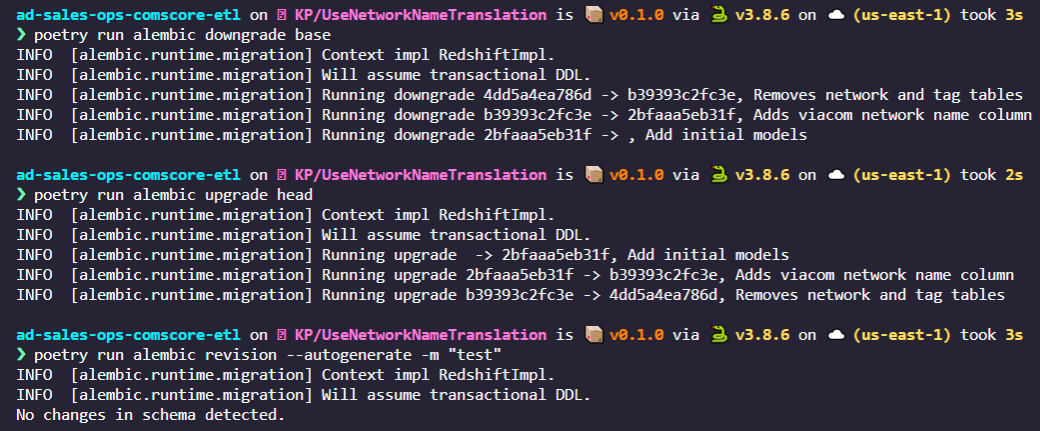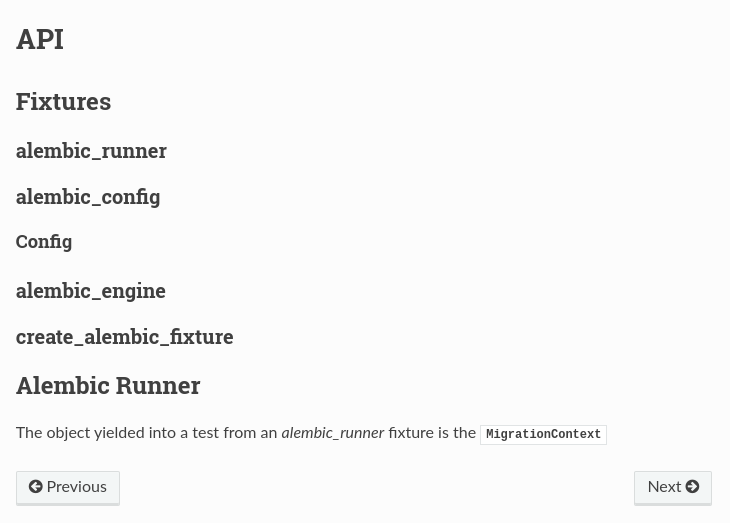See the full documentation here.
A pytest plugin to test alembic migrations (with default tests) and which enables you to write tests specific to your migrations.
$ pip install pytest-alembic
$ pytest --test-alembic
...
::pytest_alembic/tests/model_definitions_match_ddl <- . PASSED [ 25%]
::pytest_alembic/tests/single_head_revision <- . PASSED [ 50%]
::pytest_alembic/tests/up_down_consistency <- . PASSED [ 75%]
::pytest_alembic/tests/upgrade <- . PASSED [100%]
============================== 4 passed in 2.32s ===============================Have you ever merged a change to your models and you forgot to generate a migration?
Have you ever written a migration only to realize that it fails when there’s data in the table?
Have you ever written a perfect migration only to merge it and later find out that someone else merged also merged a migration and your CD is now broken!?
pytest-alembic is meant to (with a little help) solve all these
problems and more. Note, due to a few different factors, there may
be some minimal required
setup;
however most of it is boilerplate akin to the setup required for alembic
itself.
-
test_single_head_revision
Assert that there only exists one head revision.
We’re not sure what realistic scenario involves a diverging history to be desirable. We have only seen it be the result of uncaught merge conflicts resulting in a diverged history, which lazily breaks during deployment.
-
test_upgrade
Assert that the revision history can be run through from base to head.
-
test_model_definitions_match_ddl
Assert that the state of the migrations matches the state of the models describing the DDL.
In general, the set of migrations in the history should coalesce into DDL which is described by the current set of models. Therefore, a call to
revision --autogenerateshould always generate an empty migration (e.g. find no difference between your database (i.e. migrations history) and your models). -
test_up_down_consistency
Assert that all downgrades succeed.
While downgrading may not be lossless operation data-wise, there’s a theory of database migrations that says that the revisions in existence for a database should be able to go from an entirely blank schema to the finished product, and back again.
-
-
all_models_register_on_metadata
Assert that all defined models are imported statically.
Prevents scenarios in which the minimal import of your models in your
env.pydoes not import all extant models, leading alembic to not autogenerate all your models, or (worse!) suggest the deletion of tables which should still exist. -
downgrade_leaves_no_trace
Assert that there is no difference between the state of the database pre/post downgrade.
In essence this is a much more strict version of
test_up_down_consistency, where the state of a MetaData before and after a downgrade are identical as far as alembic (autogenerate) is concerned.
These tests will need to be enabled manually because their semantics or API are not yet guaranteed to stay the same. See the linked docs for more details!
-
Let us know if you have any ideas for more built-in tests which would be generally useful for most alembic histories!
For more information, see the docs for custom tests (example below) or custom static data (to be inserted automatically before a given revision).
Sometimes when writing a particularly gnarly data migration, it helps to be able to practice a little timely TDD, since there’s always the potential you’ll trash your actual production data.
With pytest-alembic, you can write tests directly, in the same way
that you would normally, through the use of the alembic_runner
fixture.
def test_gnarly_migration_xyz123(alembic_engine, alembic_runner):
# Migrate up to, but not including this new migration
alembic_runner.migrate_up_before('xyz123')
# Perform some very specific data setup, because this migration is sooooo complex.
# ...
alembic_engine.execute(table.insert(id=1, name='foo'))
alembic_runner.migrate_up_one()alembic_runner has a number of methods designed to make it convenient
to change the state of your database up, down, and all around.
pip install "pytest-alembic"


